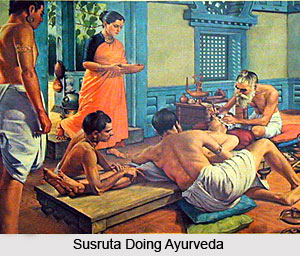 Medical Oath of Charaka is one of the vital part in Ayurvedic medical treatment. To practice Ayurvedic medicine in ancient India, seven years of intense disciplined studies in eight different branches of Ayurveda were required. On successful completion of the course, the student was further required to reaffirm his dedication to the `Science of Living` by taking the following solemn oath.
Medical Oath of Charaka is one of the vital part in Ayurvedic medical treatment. To practice Ayurvedic medicine in ancient India, seven years of intense disciplined studies in eight different branches of Ayurveda were required. On successful completion of the course, the student was further required to reaffirm his dedication to the `Science of Living` by taking the following solemn oath.
Day and night however thou mayest be engaged, thou shalt endeavour for the relief of the patient with all thy heart and soul. Thou shalt not desert or injure the patient even for the sake of thy life or thy living. Thou shalt not commit adultery even in thought. Thou shalt not covet others` possessions. Thou shalt be modest in thy attire and appearance. Thou should not be a drunkard or a sinful man, nor shouldst thou associate with the abettors of crimes.
Thou shouldst speak words that are gentle, pure and righteous, pleasing, worthy, true, wholesome and moderate. Thy behaviour must be in consideration of time and place and heedful of past experience. Thou shalt act always with a view to the acquisition of knowledge.
No persons who are hated by the king, or who are haters of the king; or who are hated by the public, or who are haters of the public shall receive treatment. Similarly, those that are of very unnatural, wicked and miserable character and conduct; those who have not vindicated their honour; and those who are on the point of death; and similarly, women who are unattended by their husbands or guardians shall not receive treatment.
No offering of meat by a woman without the knowledge of her husband or guardian shall be accepted by thee. While entering the patient`s house, thou shalt be accompanied by a man who is known to the patient and who has his permission to enter, and thou shalt be well-clad and bent of head, self-possessed, and conduct thyself after repeated consideration. Thou shalt thus properly make thy entry. Having entered, thy speech, mind, intellect and senses shall be entirely devoted to no other thought than that of being helpful to the patient and of things concerning him only. The peculiar customs of the patient`s household shall not be made public. Even knowing that the patient`s lifespan has come to its dose, it shall not be mentioned by thee there, where, if so done, it would cause shock to the patient or to others.
Though possessed of knowledge, one should not boast very much of his knowledge. Most people are offended by the boastfulness of even those who are otherwise good and well-informed.




















